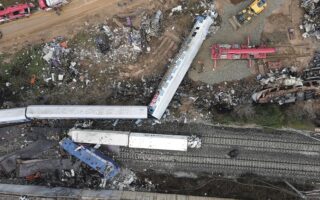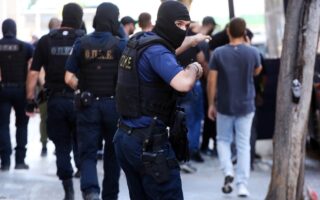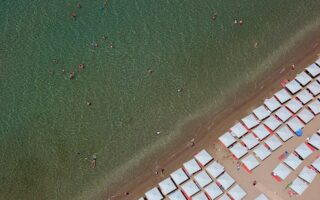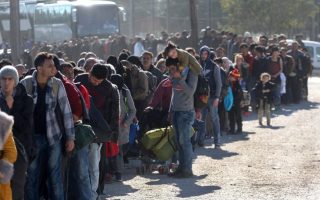This summer…
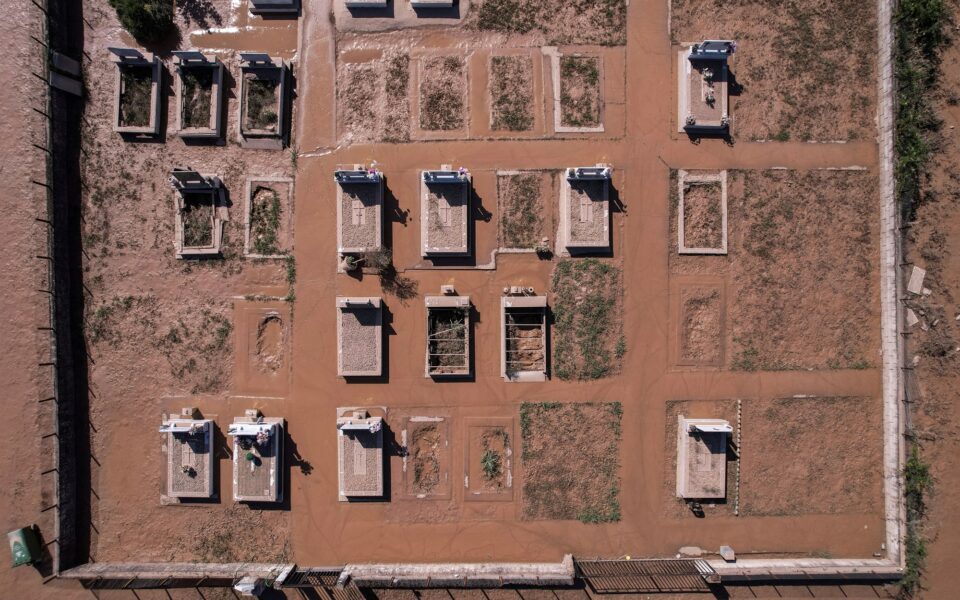
This summer, hundreds of people drowned when a ship packed with migrants sank off the coast of the southwestern Peloponnese. Dozens of Croatian hooligans defied bans, crossed the length of Greece without impediment to reach Athens, where they clashed with AEK soccer fans; a 29-year-old Greek man was killed in the brawl. In Thessaloniki, a 50-year-old man was beaten to death by a delivery driver he told off for riding his motorcycle on a pedestrian road, and in Athens, four young Greeks were arrested for the murder of a 23-year-old Pakistani migrant as he was heading to work at a farmers’ market in Perissos. In the capital’s Nea Filadelfia suburb, five people mugged a 16-year-old boy in a schoolyard, and in Kamatero, a 15-year-old was also attacked, while in Thessaloniki (on the road named after the slain victim of hooliganism Alkis Kambanos, if that says anything), a 14-year-old was jumped and beaten by a gang of seven teenagers. In Halkidiki, the ringleader of the so-called “loukoumades mafia” was set free because the 18-month limit on his pretrial detainment expired before his case was heard by a court, and a 20-year-old motorist who killed a pair of university students and their dog while driving at a speed of 125 kilometers per hour on a 40 km/hour road was finally convicted, six years after the event, but spent not a single day in prison as his sentence could be bought off.
This summer brought devastating wildfires to Attica, Magnesia, Fthiotida, Korinthia, Corfu and Evia, while the biggest evacuation operation in the country’s modern history had to be carried out on the island of Rhodes and the biggest wildfire to strike the country in modern times burned through a forest in Evros, surpassing the destruction of the fire in Evia in 2021. This summer’s fires cost the lives of 28 people, from the two firefighting pilots who went down in their Canadair in Karystos to 20 migrants who perished in Evros. In Nea Anchialos in central Greece, the fire reached an air force ammunition depot, causing a massive explosion. All this was followed by storm Daniel, which brought devastating downpours and floods to Pilio, Volos and Thessaly. Cars, belongings and buildings were swept away. Bridges that had collapsed three years ago in storm Ianos and had been rebuilt collapsed again. The magnitude of the destruction and damage is still being assessed and will continue to be until the water subsides.
This summer, police arrested a group of men who kidnapped 13 migrants and locked them in a trailer during the big wildfire in Evros. Other videos posted on social media showed other paramilitary-style groups launching attacks against foreign migrants in the border region. Smugglers posted videos on TikTok showing them packing a group of migrants into a stolen car whose license plates were visible. It turned out that the car had been stolen at the other end of Greece and crossed the country without being stopped once.
This summer, citizens lined up to renew their identity cards with new ones of the old type (even though they will expire in three years) because they believe the new type contains a microchip to keep them under surveillance. Rallies in protest at the new ID have already made an appearance in different parts of Greece, including Athens. On the Athens-Corinth national highway, motorists remained trapped in their cars for eight hours after a tanker truck carrying liquefied gas caught fire, and in Preveza, the sewage system overflowed on two separate occasions. On the island of Lesvos, a grader flattened land and structures were built for an illegal horse race in an area listed among the Natura network of protected areas in the EU and the regional governor was there for its grand opening. In almost 3,500 inspections conducted on Greece’s beaches over the month of August nearly one in three businesses were found to be violating zoning and environmental protection rules, and in several cases, the businesses restored the sunbeds they were cited for as soon as the inspectors left.
The message this summer’s events have sent, almost on a daily basis, is that almost nothing is working as it should be in this country. We are here thanks to sheer luck
This summer we also learned that an illegal landfill which had collapsed into the sea in 2011 continued growing and now covers nearly 16 hectares of the seabed. The extent of the problem was only mapped this year, thanks to funding provided by a German woman. We also learned of an amusement park that had been operating in Athens without a license for 17 years and of a man who was building a complex of luxurious bungalows in a trailer park in the protected national park of Schinias. Not to mention the mayor of Nafplio, who dumped dog poop and trash outside his rival’s summer home and in fact had done so previously on 22 occasions. And just the other day, a deckhand on the Blue Horizon pushed 36-year-old Antonis Karyotis into the sea just as the ferry boat was leaving port with its loading ramp still down, resulting in his death. The ship sailed off as if nothing was amiss and did not return to Piraeus until 40 minutes later.
All of this and much more that doesn’t fit here but may still weigh on readers’ minds, happened in the last three months. It’s a lot. Too much, in fact. Societies all over the world are dealing with problems, some worse than ours. But theirs are also too much. And when it all comes at the same time as it has done here, it becomes hard to bear. Even people who were not directly affected by this summer’s destruction and violence are finding it hard to deal with.
The message this summer’s events have sent, almost on a daily basis, is that almost nothing is working as it should be in this country. We are here thanks to sheer luck. Hate, antisocial furor and impunity are the dominant traits. And that no one will come to our rescue when things go sideways. The news every day reminds us that our institutions are unprepared, dysfunctional and corrupted. That beneath the decorative facade of a Western-style European Union member-state, our society is rotten to the core.
What makes this picture of incompetence and ineptitude even harder to bear is that it is unfolding in an ever-deteriorating setting. We all know that this summer may end up being among the coolest compared to those we are yet to experience and that the years ahead will probably be even worse than this one, when 90,000 hectares were razed by fire in Evros and 72,000 by floods in Thessaly.
How are we supposed to deal with a world that is becoming increasingly inhospitable? How are we supposed to deal with the challenges that lie ahead? With this state? With this political staff? With these citizens? With this society?
